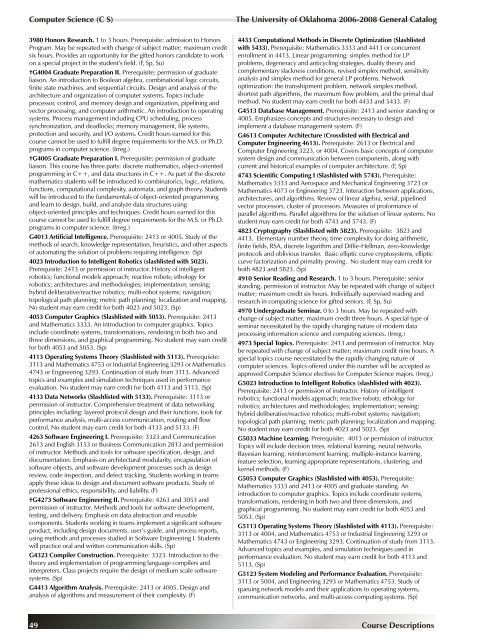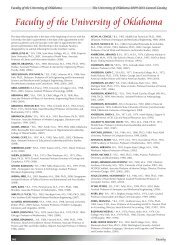ART - Catalog - University of Oklahoma
ART - Catalog - University of Oklahoma
ART - Catalog - University of Oklahoma
You also want an ePaper? Increase the reach of your titles
YUMPU automatically turns print PDFs into web optimized ePapers that Google loves.
Computer Science (C S)<br />
The Uni ver sity <strong>of</strong> <strong>Oklahoma</strong> 2006-2008 Gen eral Cat a log<br />
3980 Honors Research. 1 to 3 hours. Prerequisite: admission to Honors<br />
Program. May be repeated with change <strong>of</strong> subject matter; maximum credit<br />
six hours. Provides an opportunity for the gifted honors candidate to work<br />
on a special project in the student’s field. (F, Sp, Su)<br />
†G4004 Graduate Preparation II. Prerequisite: permission <strong>of</strong> graduate<br />
liaison. An introduction to Boolean algebra, combinatiorial logic circuits,<br />
finite state machines, and sequential circuits. Design and analysis <strong>of</strong> the<br />
architecture and organization <strong>of</strong> computer systems. Topics include<br />
processor, control, and memory design and organization, pipelining and<br />
vector processing, and computer arithmetic. An introduction to operating<br />
systems. Process management including CPU scheduling, process<br />
synchronization, and deadlocks; memory management, file systems,<br />
protection and security, and I/O systems. Credit hours earned for this<br />
course cannot be used to fulfill degree requirements for the M.S. or Ph.D.<br />
programs in computer science. (Irreg.)<br />
†G4005 Graduate Preparation I. Prerequisite: permission <strong>of</strong> graduate<br />
liaison. This course has three parts: discrete mathematics, object-oriented<br />
programming in C++, and data structures in C++. As part <strong>of</strong> the discrete<br />
mathematics students will be introduced to combinatorics, logic, relations,<br />
functions, computational complexity, automata, and graph theory. Students<br />
will be introduced to the fundamentals <strong>of</strong> object-oriented programming<br />
and learn to design, build, and analyze data structures using<br />
object-oriented principles and techniques. Credit hours earned for this<br />
course cannot be used to fulfill degree requirements for the M.S. or Ph.D.<br />
programs in computer science. (Irreg.)<br />
G4013 Artificial Intelligence. Prerequisite: 2413 or 4005. Study <strong>of</strong> the<br />
methods <strong>of</strong> search, knowledge representation, heuristics, and other aspects<br />
<strong>of</strong> automating the solution <strong>of</strong> problems requiring intelligence. (Sp)<br />
4023 Introduction to Intelligent Robotics (slashlisted with 5023).<br />
Prerequisite: 2413 or permission <strong>of</strong> instructor. History <strong>of</strong> intelligent<br />
robotics; functional models approach; reactive robots; ethology for<br />
robotics; architectures and methodologies; implementation; sensing;<br />
hybrid deliberative/reactive robotics; multi-robot systems; navigation;<br />
topological path planning; metric path planning; localization and mapping.<br />
No student may earn credit for both 4023 and 5023. (Sp)<br />
4053 Computer Graphics (Slashlisted with 5053). Prerequisite: 2413<br />
and Mathematics 3333. An introduction to computer graphics. Topics<br />
include coordinate systems, transformations, rendering in both two and<br />
three dimensions, and graphical programming. No student may earn credit<br />
for both 4053 and 5053. (Sp)<br />
4113 Operating Systems Theory (Slashlisted with 5113). Prerequisite:<br />
3113 and Mathematics 4753 or Industrial Engineering 3293 or Mathematics<br />
4743 or Engineering 3293. Continuation <strong>of</strong> study from 3113. Advanced<br />
topics and examples and simulation techniques used in performance<br />
evaluation. No student may earn credit for both 4113 and 5113. (Sp)<br />
4133 Data Networks (Slashlisted with 5133). Prerequisite: 3113 or<br />
permission <strong>of</strong> instructor. Comprehensive treatment <strong>of</strong> data networking<br />
principles including: layered protocol design and their functions, tools for<br />
performance analysis, multi-access communication, routing and flow<br />
control. No student may earn credit for both 4133 and 5133. (F)<br />
4263 S<strong>of</strong>tware Engineering I. Prerequisite: 3323 and Communication<br />
2613 and English 3153 or Business Communication 2813 and permission<br />
<strong>of</strong> instructor. Methods and tools for s<strong>of</strong>tware specification, design, and<br />
documentation. Emphasis on architectural modularity, encapsulation <strong>of</strong><br />
s<strong>of</strong>tware objects, and s<strong>of</strong>tware development processes such as design<br />
review, code inspection, and defect tracking. Students working in teams<br />
apply these ideas to design and document s<strong>of</strong>tware products. Study <strong>of</strong><br />
pr<strong>of</strong>essional ethics, responsibility, and liability. (F)<br />
†G4273 S<strong>of</strong>tware Engineering II. Prerequisite: 4263 and 3053 and<br />
permission <strong>of</strong> instructor. Methods and tools for s<strong>of</strong>tware development,<br />
testing, and delivery. Emphasis on data abstraction and reusable<br />
components. Students working in teams implement a significant s<strong>of</strong>tware<br />
product, including design documents, user’s guide, and process reports,<br />
using methods and processes studied in S<strong>of</strong>tware Engineering I. Students<br />
will practice oral and written communication skills. (Sp)<br />
G4323 Compiler Construction. Prerequisite: 3323. Introduction to the<br />
theory and implementation <strong>of</strong> programming language compilers and<br />
interpreters. Class projects require the design <strong>of</strong> medium scale s<strong>of</strong>tware<br />
systems. (Sp)<br />
G4413 Algorithm Analysis. Prerequisite: 2413 or 4005. Design and<br />
analysis <strong>of</strong> algorithms and measurement <strong>of</strong> their complexity. (F)<br />
4433 Computational Methods in Discrete Optimization (Slashlisted<br />
with 5433). Prerequisite: Mathematics 3333 and 4413 or concurrent<br />
enrollment in 4413. Linear programming: simplex method for LP<br />
problems, degeneracy and anticycling strategies, duality theory and<br />
complementary slackness conditions, revised simplex method, sensitivity<br />
analysis and simplex method for general LP problems. Network<br />
optimization: the transshipment problem, network simplex method,<br />
shortest path algorithms, the maximum flow problem, and the primal dual<br />
method. No student may earn credit for both 4433 and 5433. (F)<br />
G4513 Database Management. Prerequisite: 2413 and senior standing or<br />
4005. Emphasizes concepts and structures necessary to design and<br />
implement a database management system. (F)<br />
G4613 Computer Architecture (Crosslisted with Electrical and<br />
Computer Engineering 4613). Prerequisite: 2613 or Electrical and<br />
Computer Engineering 3223, or 4004. Covers basic concepts <strong>of</strong> computer<br />
system design and communication between components, along with<br />
current and historical examples <strong>of</strong> computer architecture. (F, Sp)<br />
4743 Scientific Computing I (Slashlisted with 5743). Prerequisite:<br />
Mathematics 3333 and Aerospace and Mechanical Engineering 3723 or<br />
Mathematics 4073 or Engineering 3723. Interaction between applications,<br />
architectures, and algorithms. Review <strong>of</strong> linear algebra, serial, pipelined<br />
vector processors, cluster <strong>of</strong> processors. Measures <strong>of</strong> pr<strong>of</strong>ormance <strong>of</strong><br />
parallel algorithms. Parallel algorithms for the solution <strong>of</strong> linear systems. No<br />
student may earn credit for both 4743 and 5743. (F)<br />
4823 Cryptography (Slashlisted with 5823). Prerequisite: 3823 and<br />
4413. Elementary number theory, time complexity for doing arithmetic,<br />
finite fields, RSA, discrete logarithm and Diffie-Hellman, zero-knowledge<br />
protocols and oblivious transfer. Basic elliptic curve cryptosystems, elliptic<br />
curve factorization and primality proving. No student may earn credit for<br />
both 4823 and 5823. (Sp)<br />
4910 Senior Reading and Research. 1 to 3 hours. Prerequisite: senior<br />
standing, permission <strong>of</strong> instructor. May be repeated with change <strong>of</strong> subject<br />
matter; maximum credit six hours. Individually supervised reading and<br />
research in computing science for gifted seniors. (F, Sp, Su)<br />
4970 Undergraduate Seminar. 0 to 3 hours. May be repeated with<br />
change <strong>of</strong> subject matter; maximum credit three hours. A special type <strong>of</strong><br />
seminar necessitated by the rapidly changing nature <strong>of</strong> modern data<br />
processing information science and computing sciences. (Irreg.)<br />
4973 Special Topics. Prerequisite: 2413 and permission <strong>of</strong> instructor. May<br />
be repeated with change <strong>of</strong> subject matter; maximum credit nine hours. A<br />
special topics course necessitated by the rapidly changing nature <strong>of</strong><br />
computer sciences. Topics <strong>of</strong>fered under this number will be accepted as<br />
approved Computer Science electives for Computer Science majors. (Irreg.)<br />
G5023 Introduction to Intelligent Robotics (slashlisted with 4023).<br />
Prerequisite: 2413 or permission <strong>of</strong> instructor. History <strong>of</strong> intelligent<br />
robotics; functional models approach; reactive robots; ethology for<br />
robotics; architectures and methodologies; implementation; sensing;<br />
hybrid deliberative/reactive robotics; multi-robot systems; navigation;<br />
topological path planning; metric path planning; localization and mapping.<br />
No student may earn credit for both 4023 and 5023. (Sp)<br />
G5033 Machine Learning. Prerequisite: 4013 or permission <strong>of</strong> instructor.<br />
Topics will include decision trees, relational learning, neural networks,<br />
Bayesian learning, reinforcement learning, multiple-instance learning,<br />
feature selection, learning appropriate representations, clustering, and<br />
kernel methods. (F)<br />
G5053 Computer Graphics (Slashlisted with 4053). Prerequisite:<br />
Mathematics 3333 and 2413 or 4005 and graduate standing. An<br />
introduction to computer graphics. Topics include coordinate systems,<br />
transformations, rendering in both two and three dimensions, and<br />
graphical programming. No student may earn credit for both 4053 and<br />
5053. (Sp)<br />
G5113 Operating Systems Theory (Slashlisted with 4113). Prerequisite:<br />
3113 or 4004, and Mathematics 4753 or Industrial Engineering 3293 or<br />
Mathematics 4743 or Engineering 3293. Continuation <strong>of</strong> study from 3113.<br />
Advanced topics and examples, and simulation techniques used in<br />
performance evaluation. No student may earn credit for both 4113 and<br />
5113. (Sp)<br />
G5123 System Modeling and Performance Evaluation. Prerequisite:<br />
3113 or 5004, and Engineering 3293 or Mathematics 4753. Study <strong>of</strong><br />
queuing network models and their applications to operating systems,<br />
communication networks, and multi-access computing systems. (Sp)<br />
49 Course Descriptions








